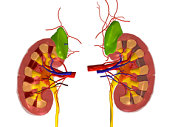Health >Kidney Failure
Why do kidneys fail?
Most kidney diseases attack the nephrons, causing them to lose their filtering capacity. Damage to the nephrons may happen quickly, often as the result of injury or poisoning. But most kidney diseases destroy the nephrons slowly and silently. Only after years or even decades will the damage become apparent. Most kidney diseases attack both kidneys simultaneously.
The two most common causes of kidney disease are diabetes and high blood pressure. If your family has a history of any kind of kidney problems, you may be at risk for kidney disease.
Acute Kidney Failure Symptoms

The following symptoms may occur with acute kidney failure. Some people have no symptoms, at least in the early stages. The symptoms may be very subtle.
Decreased urine production
Body swelling
Problems concentrating
Confusion
Fatigue
Lethargy
Nausea, vomiting
Diarrhea
Abdominal pain
Metallic taste in the mouth
Medical Treatment
Treatment is focused on removing the cause of the kidney failure.
Medications and other products you ingest will be reviewed. Any that might harm the kidneys will be eliminated or the dose reduced.
Other treatments will be offered, with the following goals:
Correct dehydration - Intravenous fluids, with electrolyte replacement if needed
Fluid restriction - For those types of kidney failure in which excess fluid is not appropriately eliminated by the kidneys
Increase blood flow to the kidney - Usually related to improving heart function or increasing blood pressure
Correct chemistry abnormalities - Keeps other body systems working properly
If your kidneys do not respond to treatment, and adequate kidney function does not return, you will need to undergo dialysis. Dialysis is done by accessing the blood vessels through the skin (hemodialysis) or by accessing the abdominal cavity through the lining that encases the abdominal organs (peritoneal dialysis).
With hemodialysis, you are connected to a machine by a tube running from a conduit created surgically between a large artery and vein. Your blood is circulated through the artificial kidney, which removes toxins and wastes. The blood is then returned to your body.
Most people require dialysis 3 times per week.
With peritoneal dialysis, wastes and excess water from the bloodstream cross into the abdominal cavity (peritoneal space) and are eliminated from the body by coursing through a catheter that is surgically implanted (through the skin) into the peritoneal cavity.
Most people with acute kidney failure get better when the cause of the kidney failure is removed or treated and don't require dialysis. Normal kidney function is usually restored, though in some cases, residual damage only allows partial restoration of the kidney function. Such patients may not require dialysis but may need medicines to supplement lost kidney function.
Self-Care at Home
Self-treatment of acute kidney failure is not recommended. Kidney failure can be a very serious condition that requires medical care.
It may be possible to receive some or all of your treatment at home. Treatment in some cases can be administered by a home health nurse under the supervision of your health care provider.
In cases in which recovery of kidney function is incomplete, the artificial kidney may be needed to clear excess water and accumulating wastes. This is done by dialysis, a process by which the blood is cleared of wastes and excess water. Dialysis, when needed for acute renal failure, is performed at a hospital or dialysis center. Home dialysis may be appropriate in cases in which kidney failure is permanent and dialysis is needed indefinitely. Dialysis at home is not allowed in some states.
|

